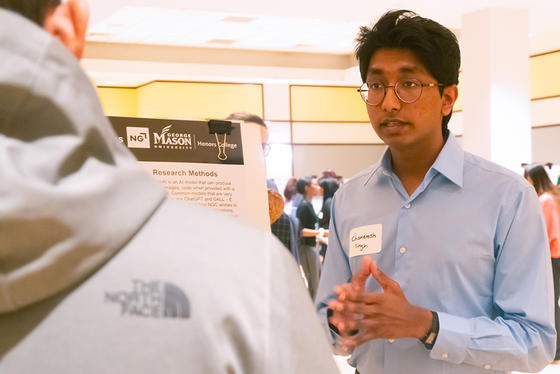How often, as an undergraduate student, are you able to sit in a room with the vice president of a leading defense contractor and offer your opinions on how they could improve their business?

For George Mason University Honors College Consult students, the answer is at least once.
Honors College Consults, first offered in 2018, is a multidisciplinary course where students serve as consultants to industry partners. Students are placed into groups, and as a team they select their top choices of clients and projects, which are then assigned by the course leader. The groups then work as consultants to determine a solution to their company’s question or concern. They have regular meetings with company representatives, take turns serving as project managers, and present their findings or solutions to the class and their partnered company.
Melanie Fedri, assistant professor in the Honors College and the college’s experiential learning coordinator, and Anthony Hoefer, associate dean for student engagement, admissions, and administration, are two of the driving forces behind the course’s curriculum and industry partnerships. The course, they explained, developed as one solution to remedying the gap between students able and unable to complete internships.
Professional development and internship opportunities are often less accessible to students outside of a particular socioeconomic status, Fedri explained. First-generation students, students working full-time, and student-parents, for example, are less able to engage in professional experiences due to their external responsibilities and lack of connections. “Because this is a course and not an extracurricular commitment, students who otherwise aren’t able to do internships can get that same experience,” she said. “It’s leveling the playing field in terms of access to education and experience.”
Alyssa Cazier, who is studying sociology, is a nontraditional student who found the class useful in preparing her for a career change. “I was a small business owner,” she said, “but the tech world is new to me, so it was a good challenge to explore a different industry. And learning the depth of research required for this project will definitely help me in the future.”
The course's final weeks see students reflect on their work to determine how best to represent their experiences in resumes, interviews, and cover letters to prepare them for the future. As consultants, the students also develop contacts throughout the companies as they interview current employees, managers, VPs, and others.
For the Fall 2023 semester, companies and organizations included Northrop Grumman, the Department of Defense, and QinetiQ US.
“We have 50% new businesses, and 50% returning businesses each semester,” said Fedri. She and Hoefer are hopeful that the diversity of companies continues to grow. A popular local restaurant might be joining the ranks this spring, thanks to a Mason alum serving as president and COO; they’re hoping to see more food, hospitality, and direct-to-consumer business as a result.
Mason alumni have been “instrumental,” Hoefer said, in connecting stalwart organizations of the course like Northrop Grumman and QinetiQ US to the Honors College.
QinetiQ US President and CEO Shawn Purvis, MS in Information Systems ‘99 and former member of Mason’s Board of Visitors, initiated the Honor College’s connections for the inaugural course and carried it through when she took the top position at QinetiQ US.
Executive director of the Bureau of Diplomatic Security Jackee Schools, BA Government and Politics ‘98 and JD ‘01, also encouraged the bureau to get involved in the course.
The benefits of this program are a two-way street for Mason and its partners. Fedri and Hoefer encourage companies to see the representative role as an opportunity for early career employees to develop mentorship and leadership experience. Companies get fresh perspectives from students with a range of diverse backgrounds and majors that might be missing from their internal conversations. And just as students are building their professional networks, the companies are building connections with the next generation of the workforce.
“It’s a way for the company to represent themselves at a level of depth you can’t get from, say, a career fair,” said David Harrison, vice president of business operations for QinetiQ US.
Harrison has participated in the program—either directly or indirectly—since its inception. As such, he has seen how the students’ analyses and research on the proposed question directly impact the company.
"Multiple semesters of students have helped shape, solve, and deliver what we believe to be a differentiating employee experience at QinetiQ US,” he said. “Students from the course have a very valuable perspective. Given they are they are our future workforce, their input carries a lot of weight as we think about how to attract and retain the best talent.
“Getting to work with five really driven, excited, diverse students who bring such thoughtful ideas to the table on difficult and complex problems has been one of my most fulfilling and valuable engagements over the years,” he said.
Read more from the Honors College
- January 12, 2026
- January 7, 2026
- December 15, 2025
- December 2, 2025
- November 19, 2025
